
China is continuously edging forward in the race towards tech innovation. Now, it has set its eyes on creating the world's first prototype exascale computer by the end of 2017 according to the state news agency Xinhua. The exascale development would make them a leading power in the world of supercomputing.
Exascale computers are capable of at least 1 quintillion (a billion billion) calculations per second and if China is able to deliver its promise, it would mark an important milestone in the history of technology and science as we know it. As of June 2016, China has 167 of the world's top 500 supercomputers which are used in fields ranging from research to defense initiatives. China is also the creator of the Sunway TaihuLight, the world's first system to exceed 100 petaflops with a clocked performance of 124.5 petaflops.
"A complete computing system of the exascale supercomputer and its applications can only be expected in 2020, and will be 200 times more powerful than the country's first petaflop computer Tianhe-1, recognized as the world's fastest in 2010," according to Zhang Ting, application engineer with the Tianjin-based National Supercomputer Center.
USA, which is also in the race of creating exascale supercomputers, has set the date of having an operational prototype by 2023 and the total cost for an exascale system is estimated to be around $3 billion.
Zhang also mentioned that the exascale computer, if used for cloud computing and big data applications, could spur innovation and high-tech programs by leaps and bounds. He also mentioned that the next-generation exascale computer will lead in calculation speed and data transmission efficiency.
It is interesting to note that it is unprecedented that a country has managed to come so far and take a lead in the digital race by not using US technology after USA blocked the export of Intel chips to China for its then-fastest supercomputer-Sunway TaihuLight in 2015, fearing the computer, if made, will be used for nuclear research.









